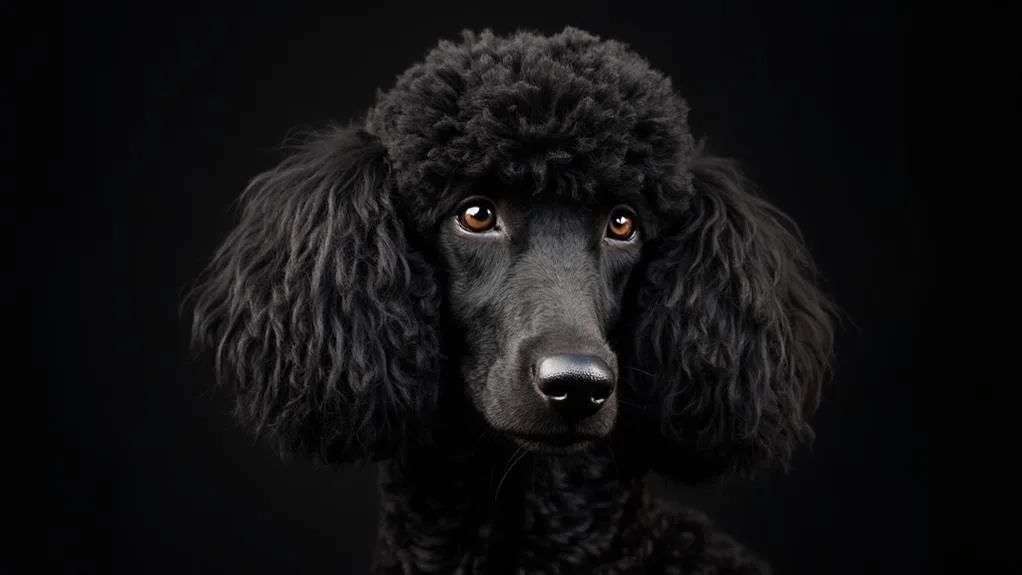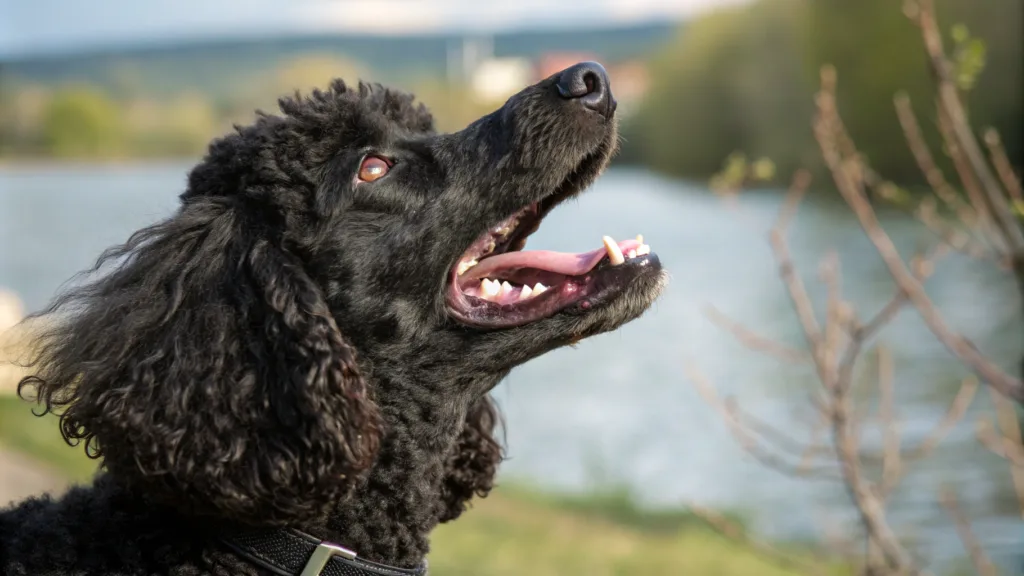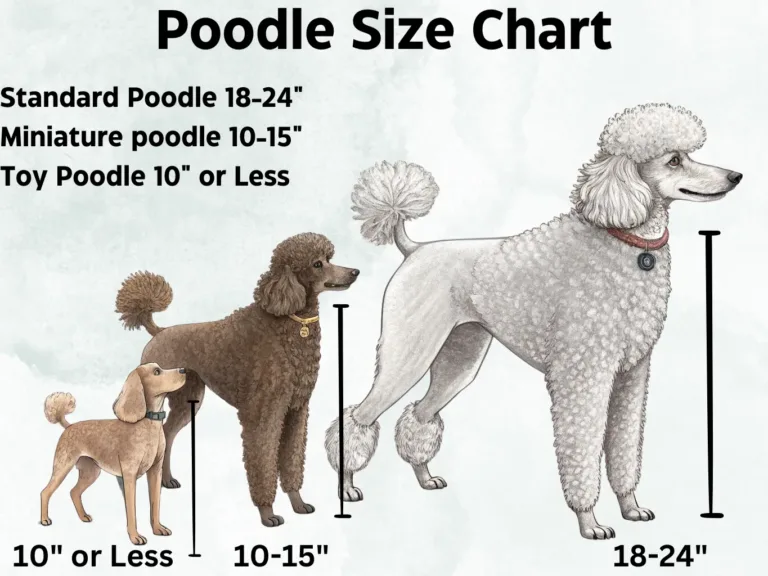Do Poodles Make Good Guard Dogs?

Poodles can make excellent guard dogs due to their natural protective instincts and high intelligence. You’ll find they’re incredibly loyal and alert, quickly detecting potential threats while maintaining a friendly disposition with familiar faces.
Their keen awareness and quick thinking allow them to assess situations rapidly, making them effective watchdogs for your family. While they may not look intimidating, poodles possess the athleticism, stamina, and protective drive to defend their loved ones.
Through proper training and socialization, you can enhance their natural guarding abilities. Discover how these sophisticated canines combine brains and bravery to become remarkable protectors.
Understanding Poodle Guard Dog Instincts

A poodle’s natural instincts as a guard dog might surprise you. While poodles are known for their elegant appearance and intelligence, they possess an innate protective nature that makes them excellent watchdogs.
Their keen awareness and strong bond with family members enable them to quickly detect potential threats and alert their owners to unusual activities.
You’ll find that a poodle’s temperament combines alertness with discernment, allowing them to distinguish between genuine threats and harmless visitors.
Through proper training and socialization, you can enhance their natural guarding instincts while maintaining their friendly disposition. Your poodle will learn when it’s appropriate to be protective and when to remain calm.
What makes a good dog for protection isn’t just size or aggression – it’s intelligence and loyalty, qualities that poodles possess in abundance.
They’ll use their sharp minds to assess situations and respond accordingly, whether that means barking to warn you of an intruder or simply positioning themselves between you and perceived threats.
With consistent guidance, your poodle can develop into a reliable guardian while maintaining their affectionate family companion status.
Natural Protective Guard Dog Traits

Building on their innate guard dog capabilities, poodles exhibit several natural protective traits that make them effective watchdogs. The standard poodle’s high intelligence and alertness allow them to quickly assess potential threats while maintaining composed protective behavior.
You’ll find these dogs excel at both guarding capabilities and companionship when proper training and socialization are implemented.
| Trait | Benefit | Training Need |
|---|---|---|
| Intelligence | Quick threat assessment | Moderate |
| Alertness | Early warning system | Low |
| Protective Instinct | Natural family defense | High |
| Adaptability | Situation-appropriate response | Moderate |
Your poodle’s natural protective traits will manifest through their attentive monitoring of surroundings and swift response to unusual activities. They’ll often position themselves between their family and perceived threats, demonstrating their innate protective nature.
While these traits come naturally, you’ll need to channel them through consistent training to guarantee your poodle develops balanced guarding behavior.
Their combination of intelligence and alertness means they’re quick to learn appropriate protective responses while maintaining their friendly demeanor with welcomed guests.
Training For Protection

When training poodles for protection work, consistent and structured guidance proves vital for developing reliable guard dog behaviors.
You’ll need to focus on channeling their natural protective instincts through proper training techniques that emphasize positive reinforcement and clear boundaries.
Start by establishing basic obedience as your foundation, then gradually introduce protective behavior exercises. You can enhance your poodle’s alertness by teaching them to recognize specific sounds or movements that warrant attention.
Remember that socialization remains essential throughout the training process – your poodle needs to distinguish between genuine threats and normal daily activities.
To develop your poodle’s protective abilities effectively, you’ll want to incorporate training and management strategies that build confidence without encouraging aggression.
Use controlled scenarios to practice their responses, always rewarding appropriate reactions while redirecting unwanted behaviors.
Consider working with a professional trainer who specializes in protection work to guarantee you’re following safe and effective methods.
Remember that every poodle’s personality differs, so adjust your training approach based on your dog’s individual temperament and natural protective instincts. Consistency, patience, and ongoing reinforcement will help shape a well-balanced guard dog.
Poodle Alert and Warning Behaviors

Through careful observation of your poodle’s alert behaviors, you’ll notice distinct warning signs that demonstrate their protective instincts. Poodles are a highly intelligent breed that displays various warning signals when they sense potential threats.
Their alertness manifests through body language changes, including raised hackles, forward-facing ears, and intense focus on unfamiliar sounds or movements.
You’ll recognize your poodle’s protective behavior through their distinct vocalization patterns. While some dogs bark indiscriminately, poodles often adjust their barking intensity based on perceived threat levels.
Their strong protective instincts become evident when they position themselves between you and unknown visitors, demonstrating both awareness and commitment to your safety.
Through proper training, you can enhance these natural warning behaviors while preventing excessive reactions. You’ll want to reinforce calm alertness rather than aggressive responses, helping your poodle distinguish between genuine threats and normal daily activities.
Watch for subtle signs like head tilting, low growls, or sudden stillness – these often indicate your poodle has detected something unusual and is evaluating the situation before responding.
Physical Defense Capabilities

Despite their elegant appearance, poodles possess surprising physical capabilities that make them effective guardians.
You’ll find that poodles are generally athletic, agile, and possess remarkable strength for their size, enabling them to respond quickly to perceived threats. Their muscular build and quick reflexes allow them to move swiftly when protecting their territory.
When it comes to physical defense, poodles combine their protective behavior with their highly intelligent nature. They’re capable of using body blocking techniques and can position themselves strategically between their families and potential threats.
Their alertness and natural agility make them adept at maneuvering in tight spaces, while their stamina allows them to maintain vigilance for extended periods.
Through proper training, you can enhance your poodle’s physical capabilities. Their vocalization skills, combined with their imposing stance when alert, create an effective deterrent.
While they may not match the raw power of traditional guard dog breeds, poodles compensate with their quick thinking and athletic abilities.
Their protective instincts, coupled with their physical attributes, make them surprisingly capable defenders when properly trained and socialized.
Security Through Intelligence

A poodle’s exceptional intelligence serves as its primary security asset. You’ll find that their quick-thinking abilities enable them to assess situations rapidly and respond appropriately to potential threats.
Unlike breeds that rely solely on physical intimidation, poodles use their sharp minds to enhance their protective behavior.
Through proper training and socialization, you can develop your poodle’s natural alertness into effective guarding capabilities. They’ll learn to distinguish between routine activities and genuine threats, responding with appropriate levels of concern.
Their intelligence allows them to remember familiar faces and patterns, making them excellent at identifying unusual situations or strangers.
You can count on your poodle’s ability to adapt their protective responses based on context. When they sense something’s amiss, they’ll often employ strategic behaviors like positioning themselves between you and potential threats or using calculated barking to deter intruders.
Their heightened awareness means they’ll notice subtle changes in their environment that might escape other breeds’ attention. This combination of intelligence and alertness makes poodles surprisingly effective guardians, despite not fitting the traditional guard dog image.
Building Protective Bonds

Developing a strong protective bond with your poodle starts with consistent, positive interactions. Through dedicated training and socialization, you’ll enhance your poodle’s natural protective behavior while maintaining their friendly disposition.
Your poodle’s adaptability allows them to recognize genuine threats while staying approachable to welcome guests.
To strengthen your poodle’s guarddog capabilities, focus on threat assessment exercises and reward-based training. You’ll notice their loyalty grow as they learn to distinguish between normal situations and potential dangers. Regular training sessions help refine their protective instincts without encouraging aggression.
Key elements for building a protective bond include:
- Establishing clear communication through consistent commands
- Exposing your poodle to various social situations safely
- Reinforcing calm, alert behavior in different environments
- Creating positive associations with protective responses
- Maintaining regular training routines to strengthen trust
Remember that your poodle’s protective nature stems from their deep bond with you. By investing time in their development, you’re not just creating a guard dog but fostering a relationship built on mutual trust and understanding.
This foundation guarantees your poodle responds appropriately to potential threats while remaining a loving family companion.
Real Cases of Poodle Protection

Real-world incidents demonstrate poodles’ remarkable protective abilities in action. You’ll find numerous accounts of poodles alerting their families to potential dangers, from intruders attempting break-ins to suspicious activities around the home. These cases highlight how proper training and socialization enhance a poodle’s natural protective instincts.
In one documented case, a standard poodle’s persistent barking alerted its owner to a nighttime intruder, effectively deterring the threat before any harm occurred.
Another instance showed how a well-trained poodle positioned itself between its owner and an aggressive stray dog, displaying controlled protective behavior without escalating the situation.
These real-life examples prove that poodles can excel as guard dogs when their natural alertness is properly channeled.
You’ll notice that successful cases often involve poodles who’ve received consistent training and socialization, allowing them to distinguish between genuine threats and normal activities.
While they may not match the intimidating appearance of traditional guard dogs, poodles’ intelligence and loyalty make them capable protectors, demonstrating that their protective abilities shouldn’t be underestimated.
Conclusion
Like a sophisticated sentinel in a velvet coat, your poodle stands ready to protect your castle. While they won’t roar like a lion, they’ll alert you with the precision of a well-trained scout.
You’re getting more than just a dignified companion – you’re gaining an intelligent guardian who’ll read situations like a skilled diplomat and sound the alarm when needed. Don’t underestimate these elegant warriors; they’re more protective than their refined appearance suggests.
FAQ: Are Poodles Protective?
Yes, standard poodles can be naturally protective. While they may not be as inherently protective as breeds such as German Shepherds or Rottweilers, standard poodles are known for their intelligence and loyalty to their families. Poodles also have a strong bond with their owners, which can lead to protective behaviors. However, their level of protectiveness can vary depending on individual temperament and upbringing. Dog training and socialization play crucial roles in developing a standard poodle’s protective instincts while ensuring they remain good with kids and friendly towards welcomed guests.
While standard poodles are not typically used as professional protection dogs like German Shepherds, Rottweilers, or Dobermans, they can be trained to provide some level of protection. Their high intelligence and eagerness to please make them receptive to protection training. However, it’s important to note that standard poodles are generally not as naturally aggressive or intimidating as traditional protection dog breeds. Dog lovers interested in training their poodle for protection should work with a professional trainer experienced in protection training to ensure proper techniques and safety measures are employed.
Standard poodles differ from traditional guard dog breeds in several ways. Unlike German Shepherds, Rottweilers, or Dobermans, poodles are not typically used as police dogs or in Schutzhund competitions. They lack the natural aggression and imposing physical presence of these breeds.






